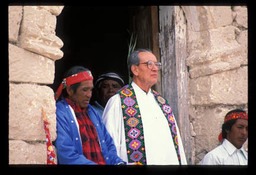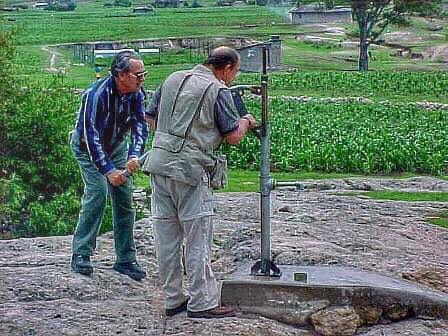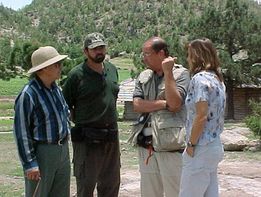The Jesuit Father Verplancken, Creel, Sierra Tarahumara
Jesuit Father Luis Guillermo Verplancken Aldayturriaga, born in 1926 in Guadalajara, Jalisco, dedicated much of his life to the well-being of the Rarámuri community in the Sierra Tarahumara. He arrived at the Tarahumara Mission in 1952 and was ordained a priest in 1957. During his life, he carried out numerous projects and programs aimed at improving the quality of life of this community, focusing on their needs and maintaining a deep respect for their values, history. and worldview.
In 1964, he founded the Santa Teresita Clinic, which saved the lives of more than 400 children a year. Later, in 1973, he established the Benésika Anagupi Intercultural Educational Center in Rejogochi, a bilingual and bicultural educational center that seeks to educate Rarámuri children in their language and culture, while encouraging the learning of traditional agricultural tasks and the making of crafts. . These initial projects were consolidated in 1992 as the "Complejo Asistencial Clínica Santa Teresita A.C.", an institution today under the responsibility of the Mexican province of the Company of Jesus.
Aware of the importance of clean water and food, Verplancken also implemented projects such as "food barter for community work" and the "water endowment project", which consisted of well drilling and water collection systems. In addition, he founded boarding schools where students learn in the Rarámuri language and Spanish, translated the Bible into the Rarámuri language and established educational scholarships, among other efforts.
The preservation of Rarámuri culture and traditions was another key concern of Verplancken. He created the crafts store "Crafts Mission" in Creel and the Loyola Museum in Cusárare, thus promoting the appreciation and recognition of the Rarámuri culture. In addition, it worked in close collaboration with various non-governmental organizations and foundations to carry out projects and programs to benefit the Rarámuri community, enhancing resources and efforts to improve the quality of life of the Rarámuri and disseminating the importance of conserving their culture and traditions.
Father Verplancken also worked on sustainable tourism initiatives in the region, seeking that the growth of tourism in the Sierra Tarahumara would benefit the Rarámuri communities and contribute to the economic and social development of the region. One of these projects was the collaboration with the Arareko community in the creation of Lake Arareko, which has become an important tourist destination and source of income for the community.
In addition to formal education, Father Verplancken promoted training and education programs for Rarámuri adults, providing them with skills and knowledge that would allow them to improve their quality of life and face the challenges of the contemporary world. These programs included training in sustainable agriculture, trades, entrepreneurship and community leadership.
Father Verplancken's legacy is kept alive through the Jesuit cultural centers in the Sierra Tarahumara, which seek to enable members of the Rarámuri communities to deepen the importance of strengthening their culture. These centers include the "Luis Felipe Gallegos SJ" in La Gavilana, the "Ernesto Uranga SJ" in Pamachi, the "Carlos Díaz Infante SJ" in Guaguachique and the "Luis Verplancken SJ" in Samachique.
Father Verplancken dedicated his life particularly to the well-being of the Rarámuri communities, he never spared efforts to improve their quality of life and was a great fundraiser for the benefit of various institutions serving the most vulnerable. He died on Sunday, the 26th of September 2004, at 77 years of age. His initial projects, such as the Santa Teresita medical unit and the Benésika Anaguipi intercultural educational center, laid the foundations for a work that encompassed multiple aspects of Rarámuri life and left a legacy that endures to this day.
In summary, Father Luis Guillermo Verplancken was a tireless defender of the rights and well-being of the Rarámuri community in the Sierra Tarahumara. His legacy in areas such as education, health, sustainable development and cultural preservation continues to influence the lives of the Rarámuri and is an inspiring example of commitment and solidarity for future generations.
Don't forget to leave us your comments and follow us on all our social networks!
We leave you sources and some works that talk about the subject for your further information.
González González, E. (2015). "Jesuit missions in the Tarahumara: cultural strategies and practices in the 20th century." Studies of New Spain History, 53, 33-66.
Gutiérrez Gómez, R. (2006). "Father Luis Verplancken and the Tarahumara community." Mexican Journal of Educational Research, 11(28), 243-248.
Moreno, R., & Pizarro, J. (2012). "Father Verplancken and his legacy: Communication, culture and development in the Tarahumara." Communication and Society, (17), 59-83.
Hernández R., J. A. (2008). Luis Verplancken, sj: His life and work in the Sierra Tarahumara. Mexico: Editorial Itaca.
Sánchez, R. (2016). "The work of the Jesuits in the education of the Rarámuri community: An approach from the perspective of Father Luis Verplancken." Ibero-American Journal of Education, 71(3), 65-84.








Comments